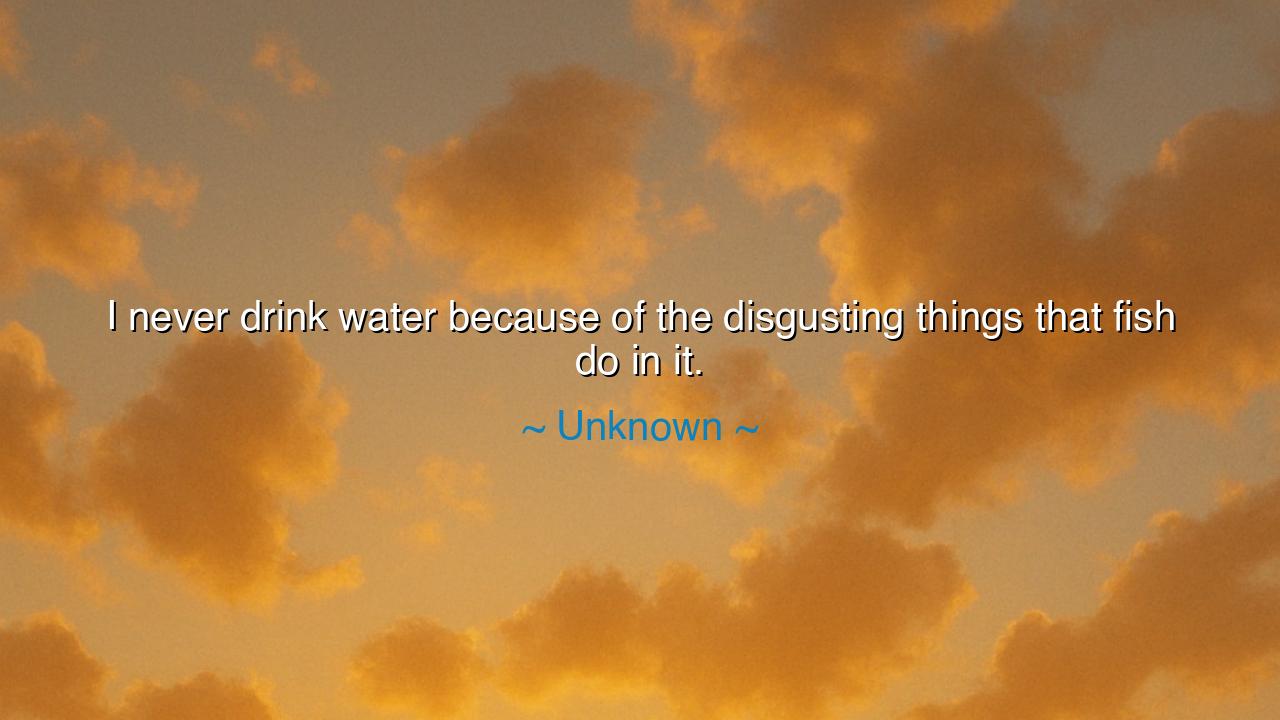
I never drink water because of the disgusting things that fish do






In the vast oceans of human thought, there are times when humor and wisdom intersect in unexpected ways. The words, "I never drink water because of the disgusting things that fish do in it," though spoken with irony and wit, carry a deeper reflection on how we perceive the world around us. While the humor may seem frivolous, the quote invites us to question our relationship with the very elements that sustain us. Water, that lifeblood of the earth, which nourishes all living things, becomes tainted in the mind of the speaker by the perceived impurities introduced by the creatures of the deep. Here lies the paradox: that which is essential to life is also, in our view, sometimes corrupted by the world we inhabit.
At the heart of this quote lies a tension between purity and perception. Water, in its most elemental form, is a symbol of cleansing, of renewal, and of the sustenance required for life. It is the most basic of all natural resources, flowing through rivers, lakes, and seas, giving life to plants, animals, and humans alike. Yet, the speaker’s words reflect a deep unease, a discomfort with the unseen processes that unfold within it. The fish, creatures of the water, whose existence is intertwined with the very element that sustains them, are seen not as part of the natural order but as agents of corruption. In this sense, the speaker embodies a universal fear—that even the purest sources of sustenance can be marred by the unknown or the unseen forces within them.
This fear of the unseen is not new. The ancient Greeks, with their reverence for both the beauty and dangers of nature, understood that what sustains us can also be a source of hidden peril. In Homer’s Odyssey, the sea, a force that nourishes and gives life to the Greeks through their trade, is also the realm of the monstrous Scylla and Charybdis, threatening to swallow whole ships and sailors. Just as the ancient mariners feared the unpredictable dangers of the deep, so too does the speaker fear the unseen pollution in the waters that sustain him. Water is both a gift and a threat, a dichotomy that mirrors our complex relationship with the natural world itself.
In a more practical sense, the quote speaks to how we often allow our perception of danger or impurity to cloud our judgment. Consider the story of Plato’s cave, where prisoners are chained to a wall and forced to watch shadows on the cave’s interior. These shadows, a distorted version of reality, become the prisoners’ truth, even though they are far removed from the real world outside. In much the same way, we allow our fears, no matter how unfounded or irrational, to distort our perception of the world around us. The speaker in this quote sees fish as corruptors of water, but the water itself remains pure and life-giving. This shift in perception is an invitation to us to question what we truly believe to be tainted and what is simply misunderstood.
The lesson here, then, is not just about water or fish, but about our approach to life itself. We must learn to navigate the world with a clear vision, not clouded by the distortions of fear or preconception. Just as the ancients learned to balance the beauty and terror of nature, so too must we find harmony in how we engage with the complexities of life. We must seek to embrace the pure sources of nourishment and sustenance that are often tangled with our own fears and doubts. To reject life’s gifts because of perceived imperfections is to live in denial of the very forces that allow us to grow, to evolve, and to thrive.
History is replete with figures who have embraced the unknown and found greatness in doing so. Leonardo da Vinci, for instance, often worked with materials that others deemed too flawed or unpredictable. His vision was not limited by the surface of things. He sought to understand the deeper truths that lay beneath the exterior. His art, his inventions, and his observations were born of a desire to embrace the natural world in all its complexity, not to shrink from its perceived dangers. Da Vinci’s genius lay not in avoiding the complexity of nature but in seeking to understand and work with it.
So too must we. The lesson of the quote is that fear of the unknown can prevent us from fully embracing life. Whether it is the waters that sustain us or the people, experiences, and opportunities that surround us, we must not let fear of the unseen keep us from embracing the fullness of our existence. The fish in the water may be seen as a disturbance, but they are also a reminder of the interconnectedness of all things. In accepting both the pure and the impure, the known and the unknown, we come closer to understanding the deeper rhythms of life itself. Let us not shrink from the waters but dive into them, embracing their depths with wisdom and courage.






AAdministratorAdministrator
Welcome, honored guests. Please leave a comment, we will respond soon